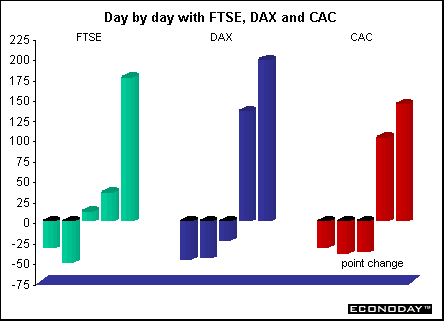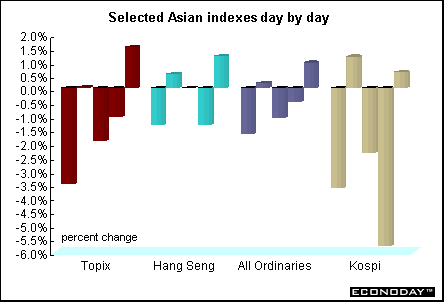
Europe and Britain
Last Wednesday, Germany's benchmark DAX Index slumped to its lowest level since September 1996 on concern that profits would shrink as economic growth stalls. More than €350 billion ($344 billion) have been erased from the value of its members since the start of 2001. But Thursday and Friday were different and the index, after losing 4 percent in the beginning of the week, rebounded vigorously on Thursday and Friday and ended the week with a net 8 percent gain. The Paris CAC 40 Index had lost 10 percent since the October 2nd close. It too rebounded on Thursday and Friday to manage a 4.9 percent gain on the week.

The DAX has fallen by 43 percent since the first of the year compared to 14 percent for the Dow. Investors' outlooks differ. While U.S. investors are in it for the long haul, eurozone investors are used to steady returns - and the hefty eurozone stock declines have left a bad taste in their mouths. With investors transfixed by slumping global markets, they are opting to stay on the sidelines, making for illiquid market conditions.
While suffering volatility with the CAC and DAX, the London FTSE 100 enjoyed its strongest day in almost three months on Friday. When the dust cleared, the index was up 3.7 percent on the week. A round of upbeat company statements helped lift investors' moods, while economic data appeased concerns over weak growth. But analysts warn that the threat of an attack on Iraq grows; things could be difficult ahead.
Asia
Asian equities indexes had a difficult week, with all but the Singapore Straits ending on the down side. Equities in Japan were affected by the uncertainties surrounding the Bank of Japan and government plans to finally dispose of bad debts. Prime Minister Junichiro Koizumi responded to plunging share prices by vowing to hasten the disposal of dud loans at banks - the very thing that pushed the Nikkei 225 Stock Average to a 19-year low. Koizumi's new minister of financial services, Heizo Takenaka, is spearheading the drive to dispose of the bad loans, which have paralyzed the banking system and starved the economy of the fresh credit it needs to expand. More companies are likely to fail as banks cut off credit. That may push unemployment higher and curb consumer spending, cutting short a recovery from Japan's third recession in a decade. Koizumi and other policy makers said that declining shares in the U.S. and a shaky outlook for world economic growth were hurting Japanese stocks as much as the prospect of speedier write-offs.

U.S. credit rating agency Fitch said that realistic measures to deal with credit and market risk may leave some major Japanese banks, which are already undercapitalized, near insolvency. They said the continued bearish sentiment in the Tokyo stock market, the news of Takenaka's appointment, and the formation of a project team has all undermined stock prices. Fitch said the market senses that the forthcoming reforms may increase corporate bankruptcies and possibly dilute existing bank shareholders. Japanese banks are heavily invested in corporate stocks, and the falling stock markets are battering their capital.


Last Week's Highlights • Global Stock Market Indexes • Recap of Global Markets • Currencies • Indicator Scoreboard

The Bottom Line • Looking Ahead
|
![[Back To Archive]](../../../images/backtoarchive.gif)